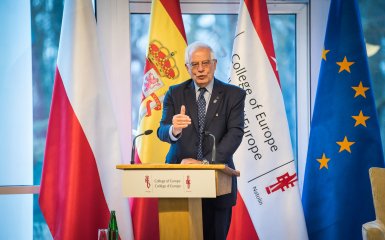The head of European diplomacy, Josep Borrell, calls to do everything possible to de-escalate the conflict between Israel and Iran against the background of Tehran's powerful strikes.
Borrell commented on the events in the Middle East
As the diplomat emphasized, he predicts Tel Aviv's response to a large-scale air attack by Iran but hopes that it will not cause further escalation.
We are standing on the edge of an abyss and must move away from it. We have to hit the brakes and engage in reverse gear.

Josep Borrell
Head of European diplomacy
The EU's high representative for foreign and security policy draws attention to the fact that there is a "deep split" in Israel's right-wing government coalition between hard-liners seeking retribution and a "more moderate and sensible" faction.
As Josep Borrell argues, the latter group favors retaliation "but in a way that avoids a response to a response."
According to him, official Brussels should have better relations with Iran despite the sanctions that the European Union has imposed against the Islamic Republic due to its nuclear energy program and other issues.
It is in everyone's interest that Iran does not become a nuclear power and that there is peace in the Middle East, added Josep Borrell.
What is known about Iran's attacks on Israel
On the night of April 13-14, Iran and its henchmen in the region launched a massive airstrike on the territory of Israel with attack drones and missiles.
Israel managed to repel these attacks successfully.
Official Tehran has made it clear that it considers its retaliation against Israel complete but is ready to react harshly in the event of a retaliatory action.
According to journalists, American leader Joe Biden convinced the Israeli prime minister to refrain from retaliating against Iran and warned that the United States would not support these actions.














